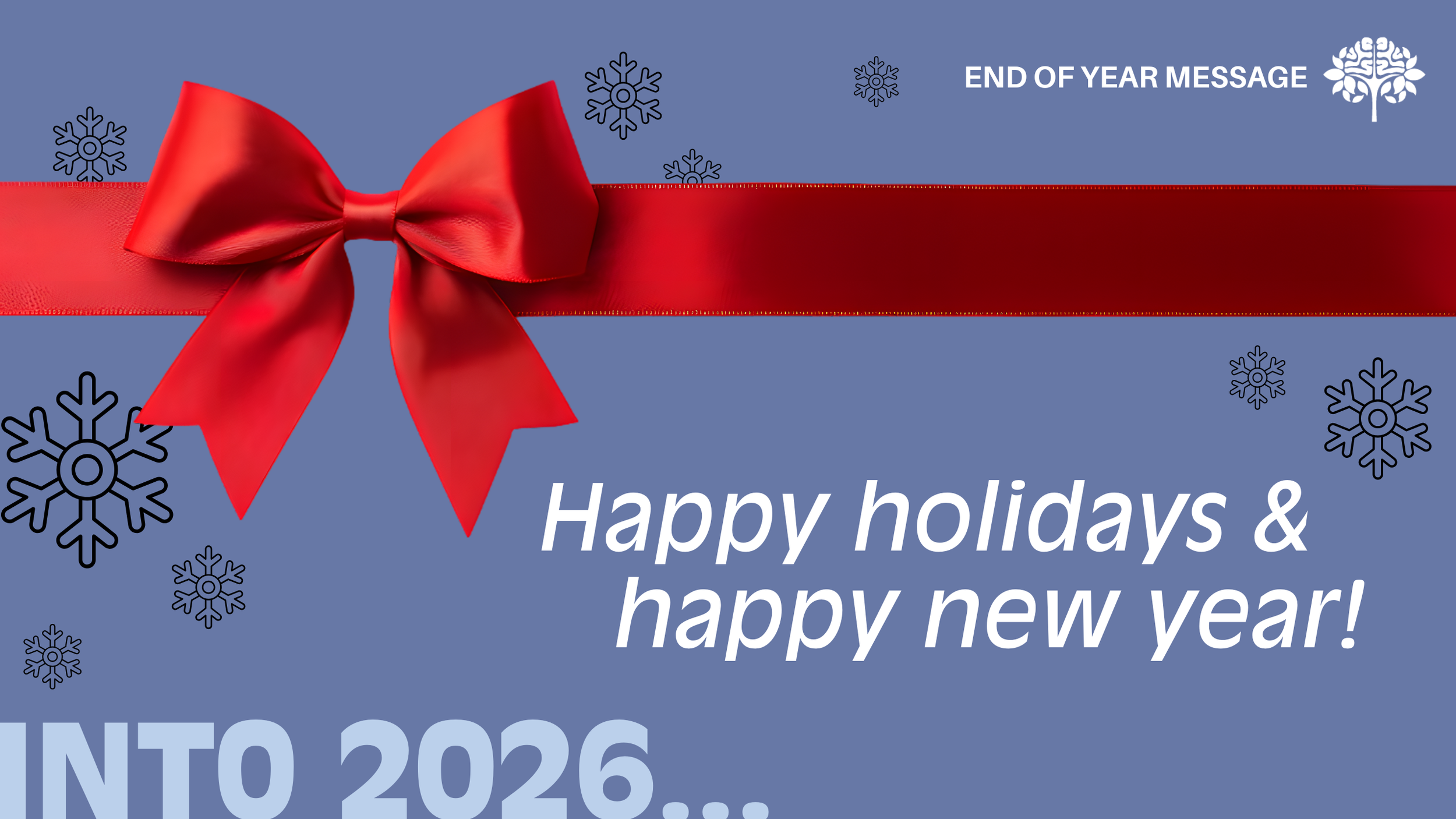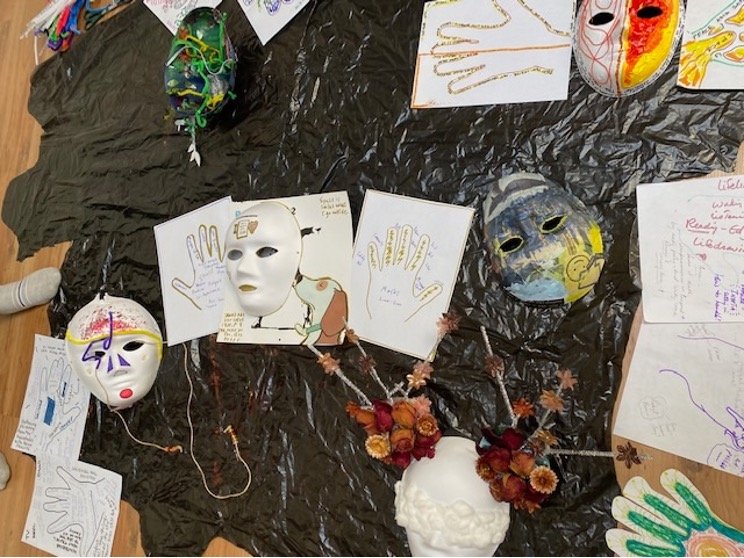
Blog
Oxytocin and the Neurobiology of Friendship
February 14th is a day commonly framed around romantic partnership. Flowers, dates, and grand gestures, but Valentine's Day also offers an opportunity to celebrate love in all contexts. From a neurochemical perspective, some of the most enduring and powerful forms of love are found in our close friendships! Oxytocin (OT), colloquially termed the “love hormone” or the “bonding hormone”, is central in forming and maintaining these connections.
BCBWP End of Year Message and 2024/2025 Annual Report
Since its inception in 2019, the BC Brain Wellness Program (The Program) has provided a source of hope and well-being for many. We are thrilled to share the progress we have made in this annual report.
New Year, New Neural Pathways: Building Healthy and Consistent Habits
With a New Year right around the corner, many of us feel inspired to start fresh and become our best selves. However, this motivation is often coupled with an undercurrent of pressure—pressure to do better, be better, and stay rigidly consistent in our resolutions.
Resources for now and for later!
Often times we don’t know what we don’t know. With so many resources out there, it can be hard to know it all! Some information is valuable now and some information will be valuable in the future.
Fang-tastic Cognitive Benefits to Halloween
Spooky season is now upon us! Whether you’re planning on cozying up on the couch for a Halloween movie marathon or rolling up your sleeves for a pumpkin carving competition, there are so many ways to get in on the fun.
Your Mouth and Brain: A Surprising Link to Total Wellness You Can't Ignore!
We've all heard about the "gut-brain connection" – how the bugs in your belly can impact your mood and mind. But what if we told you that the journey to a healthier brain actually starts right in your mouth? That's right, the oral microbiota-brain axis is the new frontier in understanding overall health, and it's far more powerful than you might think!
The Benefits of Tactile and Kinesthetic Learning Environments
Traditional education often relies on text and lectures, but human cognition is not designed to learn only through passive approaches. Our brains evolved in motion, with learning rooted in the body’s interaction with the environment. Tactile and kinesthetic learning environments where individuals learn through touch, movement, and direct manipulation, capitalize on this fact. Simply put, Tactile learning is a hands-on approach to learning that involves physical touch and movement to process information. Also known as kinesthetic learning, it prioritizes active participation over passively listening or watching, and often uses real tools, materials, and experiments to make abstract concepts tangible
Falling Into Fall: How Autumn Colours Affect The Mind
As September rolls around, the early beginnings of a crisp autumn becomes apparent.
Vancouver’s fall scenery is hard to beat, particularly in its foliage. But can typical seasonal colours – such as red or orange – affect the way we feel during this time of year?
Fall Term New Offering for Participants!
August 15th is National Relaxation Day!
Our ‘hustle culture’ often values productivity and accomplishments. While chasing goals and getting things done can feel rewarding, being in this constant ‘go mode’ can leave us mentally drained and cause us to miss out on the many benefits that mental downtime can offer. The good news is that by carving out moments for rest and mental breaks, we give ourselves a chance to recharge, spark creativity, and support our overall well-being.
The Science of Doing Nothing: How the Default Mode Network Helps You Recharge
August 15th is National Relaxation Day!
Our ‘hustle culture’ often values productivity and accomplishments. While chasing goals and getting things done can feel rewarding, being in this constant ‘go mode’ can leave us mentally drained and cause us to miss out on the many benefits that mental downtime can offer. The good news is that by carving out moments for rest and mental breaks, we give ourselves a chance to recharge, spark creativity, and support our overall well-being.
World Brain Day 2025: Celebrating Brain Health Across the Lifespan
World Brain Day on July 22nd, 2025, is a day where people come together to recognize that taking care of our brains is a lifelong journey under the theme of Brain Health for All Ages. Whether you’re learning to skip rope, navigating your career, or enjoying retirement life, brain health plays a vital role in shaping your daily experience throughout our lifespans.
Celebrate World Chocolate Day: The Sweet Benefits of Chocolate
World Chocolate Day, celebrated every year on July 7th, is the perfect excuse to indulge in a bite (or two) of chocolate. But did you know that chocolate, specifically the kind with high cacao content, can actually be good for you?
The Sleep-Brain Connection: Understanding the Mystery and Protecting Your Rest
Have you ever wondered why we sleep? Or rather, why we spend a third of our lives asleep– tucked away from the hustles and bustles of the “real world”?
Exploring the Expressive Arts: A Creative Path to Insight and Healing
We all have heard the idiom, “we all walk to the beat of our own drums.” It holds true in so many ways. Put a hundred people in a room, show them the same scene, and you’ll likely get a hundred different reactions. Each person sees the world through a unique lens shaped by their experiences, culture, and personal history.
Why the City You Live in Shapes Your Mind
Urban design isn’t just about where things go, it’s about how a place makes you feel the moment you arrive. It’s a multidisciplinary practice concerned with the physical layout, sensory experience, and psychological impact of built environments. It’s not just about structures; it’s about how environments actively shape human behaviour, perception, and quality of life.
Spring Cleaning for Your Space and Your Mind
As Spring rolls around, we pack away our winter coats and relish the beautiful cherry blossoms. What better time to spruce up our homes? Spring is traditionally seen as a period of renewal. In Thailand, they ring in the Buddhist New Year with the Songkran Festival by washing away the impurities of the past, both literally and figuratively (Dandwala, 2024).
Taking Control of Your Future: Why Advance Care Planning Day Matters for Your Health and Peace of Mind
Every day, we make countless decisions—some small, some big and others life-altering. Yet, among all these choices, one of the most important decisions we can make is our health and how we want it to be managed in the future. This is where Advance Care Planning comes into play, and it's why Advance Care Planning Day is so important for everyone.
Gut Health and Its Effect on Brain Function
Recent advances in science have deepened our understanding of the complex connection between gut health and brain function. While these two systems might appear separate, they are closely linked, especially through the role of inflammation. This article explores how gut health impacts brain health, highlighting key factors like inflammation, insulin resistance, and shares the six fundamental pillars of brain wellness.
International Women’s Day and Brain Health
In honor of International Women’s Day this month, we will be highlighting brain wellness in the context of women’s health!
Reading for Well-Being
Physical book, e-book, or audiobook are all options that can help you reap the health benefits of reading.
Benefits of Reading
Books can educate and improve the well-being of their readers. Here are more benefits to reading.
1) Helping cognitive function (Chang, Wu, Hsiung, 2020)
Reading more than once a week has been associated with slowing cognitive decline. Start slowly with 5- or 10-minutes of reading a day.
2) Stress reduction (Liu, Han, Li, & Zhao, 2024)…




















